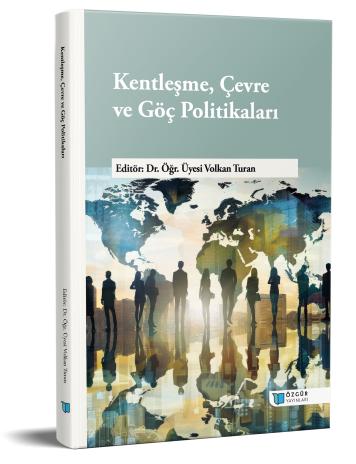
Urbanization, Environment and Migration Policies
Synopsis
Cities are residential areas where industry, trade, services and management sectors are concentrated, people make their living from these sectors, have a dense population, have their own unique economic, social, cultural and managerial organization. Because of industrialization and economic development, the number of cities has increased along with rural-to-urban migration and international migration, and cities have grown. Pollution has occurred due to inefficient, bad and excessive use of natural resources, and cities have been the areas where environmental problems have been created most. The increase in population density in cities has magnified urban and environmental problems by having a multiplier effect.
"The city is a mirror”. We can see the reflections / results of the economic, legal, administrative and social policies of the states from this mirror. We can evaluate the policy results on a scale that will cover the entire country through a few selected examples of “Mirrors”. When these results are analysed, we can ensure that the necessary corrections have been made in the policies in order to eliminate the environmental and urban deficiencies of the problems that arise. By examining the reflection of policies in the city, we can realize sustainable urbanization by ensuring economic, environmental, political and social sustainability.
In order to solve the environmental problems caused by excessive, intensive and poor use of natural resources in cities, to protect the environment and ensure a sustainable increase in the quality of life, new approaches and policies related to urban and environmental problems have been implemented. Policies to combat environmental problems caused by climate change in the world, environmental urbanization practices, Smart Cities, Resilient Cities, Water-Sensitive Cities, Quiet Cities, implementation of sustainable urban models such as Eco-cities, increasing the participation of non-governmental organizations in urban management and transformation, ensuring international migration governance, and regulations made in the legal, managerial policies and practices of states on internal migration have been applied as examples of new approaches to urbanization, environment and migration policies.
Our book consists of five chapters. In the first part, İbrahim MAVi made a comprehensive assessment through legal regulations and implementation processes by examining the legal and institutional structure of urban transformation in Turkey, the change of the roles of local and central governments with his study entitled ”Urban Transformation and Local Resistance Movements: New Urbanization Practices in Turkey". By evaluating the social, economic and spatial problems arising in the urban transformation process and the resistance mechanisms of the local population, the need for participatory, sustainable urban management was emphasized and proposals for solving existing problems were developed.
In the second part; Serdar ŞENOL state that cities are the settlements most affected by climate change with his study titled ”Climate Change and Resilient Cities" and assess that it is necessary to develop policies appropriate to this new situation in order to reduce the vulnerability of cities to the negative consequences of climate change and increase their adaptation capacity and create resilient cities.
In the third part, Veysel BAŞUSTA and Mustafa LAMBA reveal the causes of climate change with their study titled “Water Sensitive Cities and Exemplary Practices”. They state that especially the population concentration in cities causes water scarcity and water pollution, and this situation emerges as a serious threat to humanity. Stating that it is necessary to create Water-Sensitive Cities, they give information about examples of applications in the world.
In the fourth chapter, Mehmet ÖLMEZ and Bülent BAYRAK present the studies carried out in terms of institutional structuring of Turkey and the EU in the context of regional cooperation in international migration governance with their work entitled “Institutional Structuring of International Migration Governance in the Context of Regional Cooperation”. He has reached the conclusion that the EU and Turkey are at the stage of institutional structuring within the scope of regional cooperation, but regional and local governments and non-governmental organizations are not included in this process at an adequate level.
In the fifth chapter; Jale TAŞOĞLU evaluate the migration policy for Syrian refuges who took refuge in Turkey after the civil war in Syria in 2011 and whose number exceeded 4 million through the provisions of national/international legislation with her study titled ”Turkey's Unchanged Migration Policy for Syrian Asylum Seekers". Taşoğlu has set out the laws prepared by the Republic of Turkey on international migration, migration management and migration policies of migration based on international conventions and protocols, guidelines/decisions of the United Nations and the High Commissioner for Refugees, European Union guidelines/directives. The legal status of Syrian refugees and the rights granted to them within the framework of this status and the transience-based migration policy that Turkey has not given up are examined and evaluations are made.

